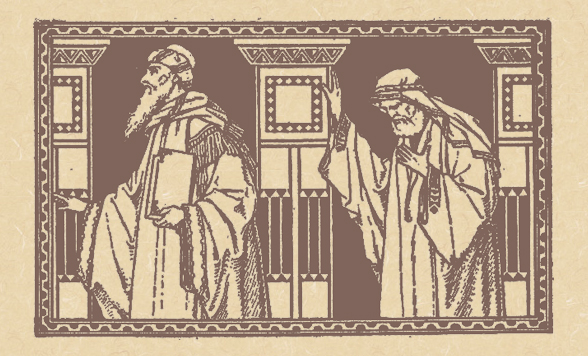The Leaven of the Pharisees.
The Sixth Tuesday of Ordinary Time.
Lessons from the secondary feria, according to the ordinary form of the Roman Rite:
• James 1: 12-18.
• Psalm 94: 12-15, 18-19.
• Mark 8: 14-21.
Sexagesima Tuesday; and, the Commemoration of Saint Simeon, Bishop & Martyr.*
Lessons from the dominica,** according to the extraordinary form of the Roman Rite:
• II Corinthians 11: 19-33; 12: 1-9.
• [Gradual] Psalm 82: 19, 14.
• [Tract] Psalm 59: 4, 6.
• Luke 8: 4-15.
FatherVenditti.com
|
 4:39 PM 2/18/2020 — In today’s Gospel lesson, our Lord uses the word “leaven” to identify the hypocrisy of the Pharisees. Don’t be confusing it with a reverence to baking; the leaven of the baker is so called because what leaven really means is the prime influential characteristic of something. In the case of bread, it’s what makes it rise. In the case of a Pharisee, it’s what makes him duplicitous. 4:39 PM 2/18/2020 — In today’s Gospel lesson, our Lord uses the word “leaven” to identify the hypocrisy of the Pharisees. Don’t be confusing it with a reverence to baking; the leaven of the baker is so called because what leaven really means is the prime influential characteristic of something. In the case of bread, it’s what makes it rise. In the case of a Pharisee, it’s what makes him duplicitous.
The word “hypocrite” comes from the Greek Φαρισαίων, and was actually a theatrical term used in the ancient Greek theater. The "hypocrite"—according to the classical definition of the word—was an actor who wore a mask and a costume in order to assume the identity of someone he wasn’t for the sake of a performance. Whether he was impersonating a king or a beggar or a tradesman, a hero or a villain, his success in assuming the character was measured by the applause of the audience. Our Lord applies this word to the Pharisees because they lived for the approval of men rather than God; their lives were as false and hollow as an actor’s mask, as his performance on a stage.
Sometimes I wonder if we fall into living this way: always worrying about what others may think, measuring our words, our actions, how we relate to others, based on what others will think of us. We all do from time to time, I’m sure, as it’s part of our fallen nature. The problem is that, when we do it enough, we may end up forgetting who we really are. Virtue, after all, springs forth from humility, and humility arises from a real and honest assessment of who we really are before God, not who we think we should be before others. And it’s all so futile, this worrying over what others will think or say. One of my favorite bromides is: We wouldn’t waste so much time worrying about what others think of us if only we realized how seldom they do.
Let us ask our Blessed Lord today to wrest us away from the sin of pride, to give us a clear vision of ourselves, not only when we examine our consciences in preparation for confession, but always, throughout the day in all of our daily encounters, and most particularly when we approach Him in Holy Communion. It’s only by facing up to who we really are outside the vision of others that we see clearly to make those changes we may need to make to be more pleasing to the one Person whose opinion alone matters.

* In the extraordinary form, Sexagesima is the second week of Shrovetide. See the footnote attached to the post here for an explanation.
Simeon, who was a close relative of the Blessed Virgin, succeeded St. James as Bishop of Jerusalem. He was crucified under Trajan in the year 106 at the age of 120. During Shrovetide and Lent, a Mass is not permitted for a commemoration.
** In the extraordinary form, on ferias outside privileged seasons, the lessons from the previous Sunday are repeated.
|

